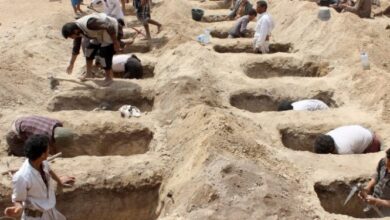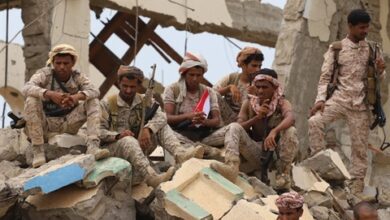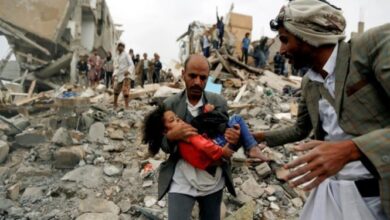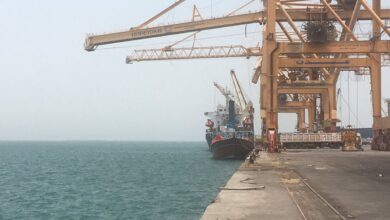Yemen war stains Saudi’s image internationally… London’s demonstration as a model
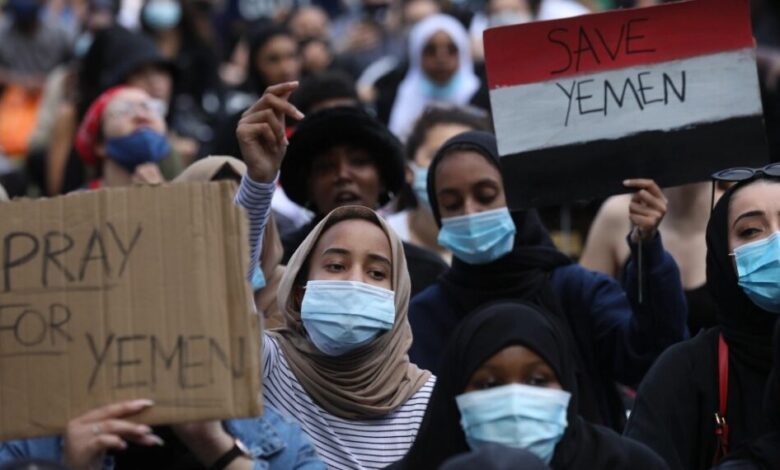
A massive demonstration in the British capital London demonstrated that the Saudi regime is seriously damaging the Kingdom of Saudi Arabia’s image by continuing its war on Yemen.
Thousands of solidarity protesters of different nationalities demonstrated in the center of the British capital, London, to condemn the Saudi war that has been going on for six years against Yemen.
The protesters raised the Yemeni flags, and banners reading in both English and Arabic “Stop the war on Yemen”, “Save Yemen”, “Boycott the Emirates”, “Stop Saudi Arabia”, “Justice for Yemen”.
The demonstration coincided with another demonstration against racism in front of the British Parliament building, in which the participants joined their voices to those calling for stopping the war on Yemen.
The demonstrators, who gathered in front of the British Broadcasting Corporation (BBC), and then the headquarters of the British Prime Minister and the governments of the European Union countries, demanded a cessation of the sale of weapons to the Kingdom and the UAE.
The demonstration against the Saudi regime comes days after reports revealed that Britain trained Saudi soldiers to use fighters, which sparked widespread anger in the country amid human rights demands to stop participating in war crimes.
The British Declassified UK organization revealed that hundreds of Saudi army soldiers have received military training in Britain since the war in Yemen began.
The report said that British soldiers trained hundreds of the Saudi-led Arab coalition forces at other bases in Britain.
The report’s author, Phil Miller, said hundreds of coalition forces soldiers had received training at RAF bases, at a time when a British court had issued an order barring British arms from being exported to the Kingdom; because of concerns about human rights violations in the Yemen war.
France and Germany have previously confirmed the responsibility of the Saudi regime of ending the suffering of the Yemeni people, finding a peaceful solution to the war that has been going on for years, and ending the Yemeni crises.
These accusations came at a joint press conference held by the delegates of the two countries to the United Nations, German Ambassador Christoph Huisgen and his French counterpart Nicholas de Riviere.
The German ambassador said that his country “has stopped selling arms to Saudi Arabia, and that the Kingdom has a great responsibility to end the violence as it leads an alliance that launches air strikes throughout Yemen.”
He added: “We need Saudi Arabia to play a very important role in order to reach a peaceful solution to the crisis.”
The French ambassador affirmed his full agreement with his German counterpart, expressing his hope that the international donors conference will collect sufficient financial resources to face the repercussions of the Yemeni crisis.
For the sixth year, Yemen has witnessed continuous fighting between government forces supported by an Arab coalition led by Saudi Arabia and the United Arab Emirates, and the Iranian-backed Houthi group controlling Yemeni provinces, including the capital, Sanaa, since September 2014.
In its report, Amnesty International recently stated that the war in Yemen does not show any real signs of decline as it enters its sixth year, and civilians from all parts of the country and generations continue to bear the brunt of military hostilities and illegal practices of both governmental and non-governmental armed groups.
Amnesty stressed that there are serious human rights violations, including what may amount to war crimes, throughout the country.
By the end of 2019, it is estimated that more than 233,000 Yemenis have died as a result of the fighting and the humanitarian crisis.
The World Health Organization fears the possibility of a widespread outbreak of the Coronavirus in Yemen, given that the level of population immunity from disease is one of the lowest compared to other countries. In addition, the ongoing war has undermined the health system in the country and pushed millions to the brink of starvation, and caused the spread of serious diseases in stages such as cholera and typhoid, Dengue fever.
It is estimated that the Yemen war costed Saudi Arabia alone about 100 billion dollars, which resulted in a financial haemorrhage at a rate of 5-6 billion dollars per month, while the total cost of the conflict is estimated at more than 200 billion dollars.


